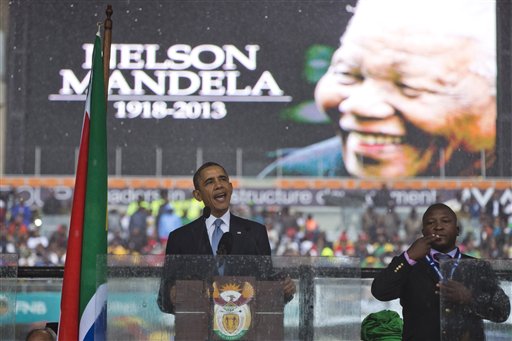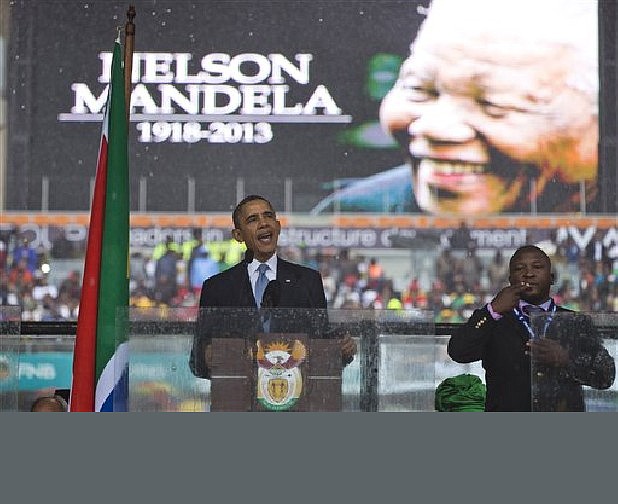Interpreter for deaf at Nelson Mandela's memorial service called fake
Wednesday, December 11, 2013
 President Barack Obama delivers his speech next to a sign language interpreter during a memorial service at FNB Stadium in honor of Nelson Mandela on Tuesday, Dec. 10, 2013, in Soweto, near Johannesburg. The national director of the Deaf Federation of South Africa says a man who provided sign language interpretation on stage for Nelson Mandela's memorial service in a soccer stadium was a "fake."
President Barack Obama delivers his speech next to a sign language interpreter during a memorial service at FNB Stadium in honor of Nelson Mandela on Tuesday, Dec. 10, 2013, in Soweto, near Johannesburg. The national director of the Deaf Federation of South Africa says a man who provided sign language interpretation on stage for Nelson Mandela's memorial service in a soccer stadium was a "fake."JOHANNESBURG - The sign-language interpreter on stage at Nelson Mandela's globally broadcast memorial service was a faker who was waving his arms around meaninglessly, advocates for the deaf said Wednesday.
The allegation raised questions of how and why he managed to insert himself into a supposedly secure event attended by scores of heads of state, including United States President Barack Obama.
As one world leader after another took the stage in a gigantic soccer stadium to pay homage to Mandela, the man at arm's reach from them appeared to interpret for the deaf at the hours' long memorial so the world's deaf population could understand the historic event.
The allegation of the use of a bogus sign interpreter was yet another example of bad organization at the service Tuesday. Other problems included breakdowns in public transportation that hindered mourners from getting to the soccer stadium and a faulty audio system made the remarks of world leaders inaudible for many. Police also failed to search the first wave of crowds who rushed inside the stadium after authorities opened the gates just after dawn.
The unidentified man, who stood about one yard (one meter) from Obama and other leaders, "was moving his hands around but there was no meaning in what he used his hands for," Bruno Druchen, the deaf federation's national director, told The Associated Press.
When South African Deputy President Cyril Rampaphosa told the crowd that former South African President F.W. de Klerk was among the guests in a VIP section, the man at his side used a strange pushing motion unknown in sign language that did not identify de Klerk or say anything about his presence in the stadium, said Ingrid Parkin, principal of the St. Vincent School for the Deaf in Johannesburg.
The closest the man's gestures at that point came to anything in sign language might possibly be the words for "running horse," ''friend" or "beyond," she said, but only by someone who signs terribly. The man also used virtually no facial expressions to convey the often emotional speeches of the leader, an absolute must for sign language interpreters, Parkin said.
Collins Chabane, one of South Africa's two presidency ministers, told reporters the government is investigating "alleged incorrect use of sign language at the National Memorial Service" but has not finished because it has been overwhelmed with work organizing public viewing of Mandela's body in the South African capital of Pretoria and his funeral Sunday in his hometown of Qunu. He did not identify the man but added the "government will report publicly on any information it may establish."
Four sign language experts, including Druchen and Parkin, told the AP the man was not signing in South African or American sign languages and could not have been signing in any other known sign language because there was no structure to his arm and hand movements. South African sign language covers all of the country's 11 official languages, according to the federation.
Outraged deaf people and sign language interpreters from Canada to China have complained about the man, Parkin said.
"This man himself knows he cannot sign and he had the guts to stand on an international stage and do that," Parkin said. "''It's absolutely impossible that he is any kind of interpreter. Or a language person at all, because he's not even using a language there."
Nicole Du Toit, an official sign language interpreter who also watched the broadcast, said in a telephone interview that the man was an embarrassment for South Africa.
"It was horrible, an absolute circus, really, really bad," she said. "Only he can understand those gestures."
The man also did sign interpretation at an event last year that was attended by South African President Jacob Zuma, Druchen said. At that appearance, a deaf person in the audience videotaped the event and gave it to the Deaf Federation of South Africa. The federation analyzed the video, prepared a report about it and a submitted a formal complaint to the governing African National Congress party, Druchen said.
In their complaint, the federation suggested that the man should take the five years of training needed to become a qualified sign language interpreter in South Africa. But the ANC never responded, Druchen said.
Druchen said a fresh complaint will be filed to the ANC with a demand for an urgent meeting. The federation does not know the identity of the man.
"We want to make a statement that this is a warning to other sign language interpreters who are fake and go about interpreting," Druchen said. "I am hoping the South African government will take notice of this."
ANC spokesman Jackson Mthembu declined comment.
Bogus sign language interpreters are a problem in South Africa because people who know some signs, frequently because they have deaf relatives, try to pass themselves off as interpreters, said Parkin, the principal of the school for the deaf. And those contracting them usually don't know how to sign, so they have no idea that the people they are hiring cannot do the job, she said.
"They advertise themselves as interpreters because they know 10 signs and they can make some quick money," said Parkin. "It is plain and simple abuse of the deaf community, they are taking advantage of the deaf community to make money."
In Washington, White House spokesman Josh Earnest said he was unaware of any security concerns related to the fake interpreter. Responding to questions, Earnest said: "It's a shame that ... a service that was dedicated to honoring the life and celebrating the legacy of one of the great leaders of the 20th century has gotten distracted by this and a couple of other issues that are far less important than the legacy of Nelson Mandela."
